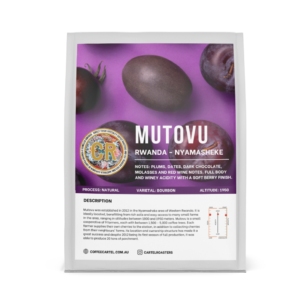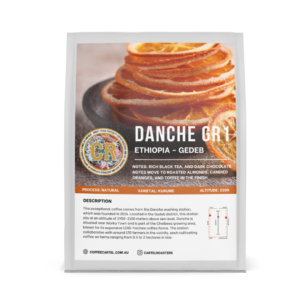About this coffee
- Altitude: 2100 MASL
- Farmer: VARIOUS SMALL HOLDERS
- Score: 89
- COUNTRY: ETHIOPIAN JUMUNGA - GUJI
TASTING NOTES: PURPLE FRUIT, CHERRY, LEMON, CHOCCHIP, CARAMEL LONG LINGERING FINISH.
Description: A lucky purchase Ethiopian Jumunga this coffee is a stunning G1 coffee with that typical profile of a Guji profile. This was a combination of around 40 bag lot that was blended and triple picked from Guji small farm holders for a flawless cup profile loads of sweetness and berries though not intense almost tea like.
This region is located inside Guji Zone of Oromia regional state of Ethiopia. Coffee farmers in Guji are small-scale landholders, but often have larger acres of land comparing to other coffee growers in the country. Farmers in this area have coffee trees at elevations ranging from 1,945-2100 meters above sea level. Farmers speak mainly Afaan Oromo and Amharic languages.
What makes the process successful is the attention given to the details in the process from the day the cherry is picked from the tree until it arrives to the warehouse. In harvesting time, only fully matured coffee cherries are processed. The fully ripe cherries will be taken to the drying bed within 8 hours of picking. The beds are loaded with purple ripe fruit and carefully sorted for about 20 days in the sun and shade depending on the weather then held for approx 2 months before heading too Addis to be cleaned.
Coffee traditionally grows in the understory of indigenous trees and canopies in Guji, intercropped with false banana and other crops. It has been growing for centuries in ecologically sound and conducive environment in the midst of a wide range of biodiversity in perfect harmony.
SOME HISTORY ON ETHIOPIA
Ethiopia earned 866 million USD exporting 221,000 tons of coffee during its last fiscal year .
According to Ethiopian Coffee & Tea Development and Marketing Authority, it has accomplished 92 per cent of its set goal to increase coffee exports. ” It is a very great achievement compared to nation’s previous years’ coffee export performance .”
Comparing to the coffee export volumes of 2015/16, there had been 11.5 Per cent growth in the coffee exports during the just concluded fiscal year 2016-17. Plus ,the foreign earning from coffee has raised by 20 percent due to the global coffee price hikes .
In a recent exclusive interview with The Ethiopian Herald, Market Development and Promotion Directorate Director Dassa Daniso said: ” Ethiopian Coffee has been imported to over 60 countries. But, this year, 57 countries have imported our coffee, particularly, 86 per cent ofthe total coffee exports destined for Germany, Saudi Arabia, Japan, USA, Belgium, Sudan, South Korea, among others.”
Coffee all started in Ethiopia in the 9th Century when the goat-herder Kaldi, noticed his goats acting more spritely after consuming cherries from a certain plant. Kaldi tried the cherries and noticed some of the familiar effects that we all feel when we enjoy some of the good drink in the morning. While this is a popular account of the ‘Discovery’ of coffee, there are other accounts of traders chewing cherries on trade routes from Ethiopia in order to increase energy. Ethiopia’s history is full of dramatic changes. Over the last four decades, the Ethiopian people have lived under three different forms of government, which include a semi-feudal imperial, a military rule with Marxist ideological orientation from 1974-1991, and a federal governance system from 1991 until the present. All of these periods have been accompanied by dissatisfaction, armed resistance and rebellions. Ethiopia has also confronted economic, social and environmental problems including a war with Eritrea from 1998-2000. This recent dispute with Eritrea as well other historical conflicts has provoked many damages, including lost lives, limited access to the land, emotional trauma, and extreme hunger.
Coffee still grows wild in Ethiopia’s mountain forests. Ethiopian farmers cultivate coffee in four different systems, which include forest coffee, semi-forest coffee, garden coffee and plantation coffee. About 98% of the coffee in Ethiopia is produced by peasants on small farms and it is the country’s most important export. Ethiopia is Africa’s third largest coffee producer. There are about 700,000 coffee smallholders in Ethiopia, of which 54 percent are in semi forest areas. Coffee has been part of their indigenous cultural traditions for more than 10 generations.
I brewed using an espresso machine, 18g 26s. It’s perfect for a
This coffee is equal with the best other coffee I have drank this year (Honduran anaerobic 72 hour).
Brewed using a Kalita Wave and dialled in for around a 2:30 extract time. As the label describes great purple fruit notes (purple grape?), nice acidity without being extreme like some Guji coffee and a nice smooth caramel after taste. As it cools you settle in to more traditional coffee flavours, but still a delicious and smooth cup.
It’s great when the coffee tasting notes match the actual experience. Thank you Coffee Cartel!





